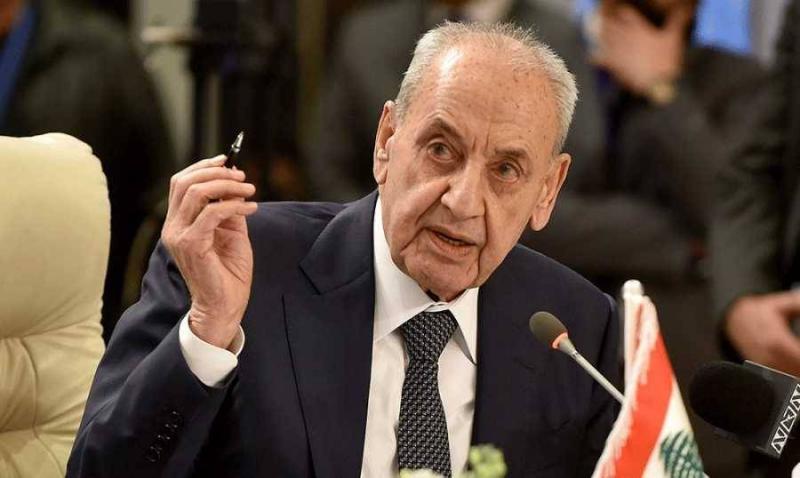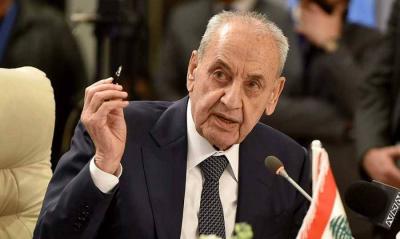The Speaker of Parliament, Nabih Berri, confirmed to "Asharq Al-Awsat" that he reached an agreement with ambassadors from the countries of the Quintet Committee accredited to Lebanon on making the presidential election a Lebanese affair. He stated that the Quintet, composed of Saudi Arabia, Egypt, Qatar, the United States, and France, serves only as a support group for the MPs to facilitate the election of a president and that it has no candidate and does not veto any candidates.
Berri noted that during his last meeting with the Quintet ambassadors, they did not discuss a third presidential option (an alternative candidate to Hezbollah’s nominees and the opposition). He indicated that he reciprocated by not mentioning any candidate's name and that they did not object to his call for parliamentary blocs to meet and engage in dialogue, hoping this would lead to a consensus that opens the door for an immediate invitation to hold an open parliamentary session with consecutive rounds to elect a president.
He expressed that he discussed with the ambassadors the understandings behind the extension of Army Commander General Joseph Aoun and the heads of security agencies, viewing it as necessary to broaden these understandings to potentially agree on electing a president.
Berri asked his visitors about the usefulness of wasting time and accusing him of obstructing the committee's role in assisting Lebanon in overcoming the presidential election stalemate, asserting that his meeting with Saudi Ambassador Walid Bukhari, Qatari Ambassador Saud bin Abdulrahman bin Faisal Al Thani, Egyptian Ambassador Alaa Moussa, French Ambassador Hervé Magnon, and U.S. Ambassador Lisa Johnson was positive, promising, and beneficial, as confirmed by several ambassadors following the meeting.
He emphasized the agreement with the Quintet ambassadors on the necessity of not linking the presidential election to the war in Gaza and the ongoing confrontation in the south. He stated that developments on the fronts of the south and Gaza should motivate a presidential election today rather than tomorrow. The ambassadors supported his viewpoint and responded positively, particularly noting that the fast-paced developments in the region necessitate the swift election to posiitoning Lebanon at the table if certain formulas or settlements require upholding rights.
Berri insisted that there can be no trade-off between the situation in the south and the presidential election, stating that the implementation of Security Council Resolution 1701 must be adhered to without alteration. He advised that anyone demanding compliance with it should approach Israel to request the evacuation of points previously reserved by Lebanon and to stop violations of Lebanese airspace, land, and maritime boundaries, as there is no room for compromising internationally recognized borders.
In this context, a political source told "Asharq Al-Awsat" that there is nothing preventing the Quintet ambassadors from meeting with heads of parliamentary blocs, emphasizing the necessity for meetings and communication. It depends on them to determine the mechanism of contact, whether collectively or individually, particularly since several obstacles exist, such as U.S. Ambassador Lisa Johnson not being part of the delegation that will meet with the head of the Free Patriotic Movement, MP Gebran Bassil, aligning with U.S. sanctions against him, and this applies to her absence from meetings with Hezbollah.
The political source believed that simply agreeing on a ceasefire or truce in Gaza would reflect on the heated front in southern Lebanon between Israel and Hezbollah, which affirms its commitment, according to close sources, particularly since it previously adhered to a truce reached by Hamas with Israel.
He revealed that Saudi Arabia is keen on the election of a president, urging MPs to expedite the presidential process and commit to implementing the necessary reforms to save Lebanon. This is confirmed by its representative in the Quintet, advisor at the royal court Nizar Al-Alula, and pursued by its ambassador to Lebanon, Walid Bukhari. Saudi Arabia maintains its insistence on not endorsing any presidential candidate or placing a veto on a specific candidate, as conveyed to the Progressive Socialist Party's envoy to Riyadh, MP Wael Abu Faour.
A prominent source in the Progressive Socialist Party noted that Saudi Arabia has stated its non-intervention in the name game and that the election of a president is up to the Lebanese MPs, and it will define its position later based on the criteria set by the Quintet for the future president, along with the required reform measures as a necessary passage for Lebanon to transition into a phase of financial and economic recovery.




